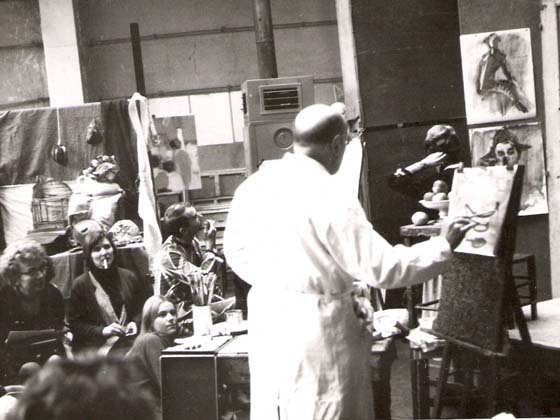Quite laughable to see ‘la jeune fille’ emerge from 8 rue Jacob in slippers and bathrobe.But, at the same time, it’s quite naturel. It’s an early morning ritual. A croissant run. Everyone in the quartier does it.
By now postal workers are already on their second eye-opener at the zinc and queues are getting long at the local boulangerie.
‘L’étrangère’ joins the line, looking quite comfortable because she knows she belongs. When her turn comes she sings out in French which I think is quite good:
“Six croissants au beurre, madam, s’il vous plait,”
“Oui, mademoiselle”, Madame Germaine sings back as she scoops the fresh golden crescents right from the pan.
“Au revoir!” Ilze intones as she grasps the greasy brown bag of warm buttery croissants and head out the door.
Just a step and a skip and she’s back. Before taking the flights of stairs to the third floor she stops at the rez de chausée and rushes to the metallic mailboxes. (Heavenly Paris! Mailmen come twice a day, including Saturdays – and then there’s the blessed pneumatique which ferries mail through a long tube from household to household.)
Mon Dieu! There’s quite a handful of mail this morning. Most of it for her roommate, Ginny Stikeman. But wait. There is something for her! It’s an invitation.
Up three flights of stairs, like a ballerina. Naturellement, she’s only barely twenty-one.
As she reaches the second floor she can already smell the coffee. That’s Ginny’s job.
Then back in bed with letters and a tray. A huge warm bed, the only one in the tiny apartment. How sweet to share with a girlfriend. In Paris it was comme il faut.
Soon the phone will ring. What luxury!
It will ring on weekends but on weekdays les jeunes filles sally forth to work. Ilze is a dental assistant (quel désastre!) to a pied-noir (derogatory term for an Algerian). Ginny works for an insurance company just off the Champs Elysée.
Today is Saturday. The phone has not rung yet and so they linger over mail.
Ilze inspects an invitation from the Akademia Raymond Duncan. Well, not a hot social event but being Latvian and being into the arts she makes a note of the date.
Raymond Duncan and Aija Bertrand.
Oh là là! These people! Even in Paris they are a spectacle.
Still, they’re fascinating.
Aija Bertrand. So little is known about her other than that she’s Latvian.
Some think of her as something of a slum landlady, although her crumbling old house is hardly in a slum. 31 rue de Seine has a certain bohemian cachet as it’s on the Left Bank and right in the heart of the Latin Quarter with its crooked narrow streets, small hotels, quaint bookshops, art galleries, antique vendors, cafes and cubbyhole restaurants.
Aija Bertrand did not seem odd or shabby to Ilze but a goddess draped in a wool mantle and wearing what appeared to be a Latvian national headdress.
Then there’s her husband, Raymond Duncan, the brother of the celebrated dancer Isadora Duncan, all decked out in long white Roman toga and sandals he’s fashioned himself.




